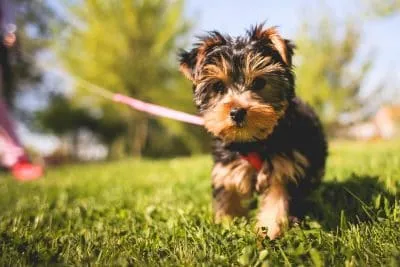Are you searching for “Puppy Behavior Training Near Me” because you’re facing challenges with your young dog’s actions? It’s a common concern for new and experienced dog owners alike. The journey of raising a puppy is filled with joy, but it also comes with the responsibility of guiding them towards good behavior. Early intervention through effective puppy training is crucial for preventing future problems and fostering a strong, harmonious relationship with your pet. This guide is designed to equip you with the knowledge and strategies needed to address common puppy behaviors and find the right training support for your furry friend.
As a dedicated professional in the field of dog behavior and training, my mission is to empower dog owners with the understanding and tools to help their puppies thrive. The goal isn’t just to teach commands, but to build a foundation of trust, communication, and mutual respect. This approach transforms the often chaotic puppy phase into a rewarding experience, creating a relaxed and well-adjusted canine companion for years to come.
Understanding Puppy Behavior: The Foundation of Training
Puppies are bundles of energy, curiosity, and developing instincts. Their behavior, while sometimes challenging, is often a natural expression of their age and breed. Common issues owners seek help for include:
- Chewing: Puppies explore the world with their mouths, especially during teething. This can lead to chewing on furniture, shoes, and other inappropriate items.
- Barking: Excessive barking can stem from various reasons like boredom, seeking attention, anxiety, or territorial instincts.
- Potty Accidents: House-training takes patience and consistency. Accidents are a normal part of the process, but require a structured approach to resolve.
- Jumping and Nipping: These are often playful behaviors that need redirection to ensure your puppy learns appropriate greeting manners.
- Leash Pulling: Young dogs may not understand how to walk politely on a leash, leading to a frustrating experience for both dog and owner.
The key to addressing these behaviors effectively lies in understanding the underlying reasons for them and implementing consistent, positive training methods. When you look for “puppy behavior training near me,” you’re seeking guidance that acknowledges these natural puppy tendencies and offers practical solutions.
 A playful Yorkshire Terrier puppy looking curious in a garden setting
A playful Yorkshire Terrier puppy looking curious in a garden setting
The financial and emotional costs of behavioral issues can be significant. A puppy that bites a neighbor or escapes your yard can lead to severe consequences, including legal issues or accidents. Investing in professional puppy training early on is a proactive measure that saves both stress and money in the long run. It allows you to preemptively shape your puppy’s behavior, ensuring they grow into a well-mannered member of your family and community.
Why In-Home Puppy Training is Effective
The “puppy behavior training near me” search often leads to specialized services like in-home training. This approach offers distinct advantages:
- Real-World Environment: Training in your own home allows the trainer to address issues exactly where and when they occur. This is invaluable for correcting specific behaviors like chewing on furniture or house-training accidents.
- Owner Education: Effective training focuses not only on the puppy but also on educating the owner. Understanding your puppy’s motivations and learning how to communicate effectively is as important as the puppy’s learned behaviors.
- Personalized Approach: In-home sessions are tailored to your specific puppy’s needs, breed characteristics, and your family’s lifestyle. This personalized attention ensures the training plan is realistic and achievable.
My approach, for instance, emphasizes building a strong connection between dogs and their owners. I provide “Basic Training and Instruction for dogs and their People,” often calling myself the “Dog Fixer.” This highlights the collaborative nature of training, where both human and canine learn and grow together.
Mastering Key Puppy Training Techniques
When you find “puppy behavior training near me,” you’re looking for proven methods that yield results. A cornerstone of successful puppy training involves clear communication and consistent reinforcement.
The “Stop, Sit & Wait” Method
A fundamental technique I demonstrate is the “Stop, Sit & Wait” method. This isn’t just about making your puppy sit; it’s about teaching them impulse control and to pause before acting. I show owners how and why this works, explaining the timing and techniques needed for its successful deployment.
 Joe Ozier demonstrating dog training techniques
Joe Ozier demonstrating dog training techniques
This method begins the moment the leash is on. It’s about redirecting unwanted behaviors by teaching your puppy to wait for your cue. This is especially helpful for what many owners describe as a “stubborn dog” who seems to ignore them. The goal is to gain your puppy’s attention and ensure they listen to your commands, fostering a sense of respect and responsiveness.
Redirecting and Managing Behavior
Puppies, left to their own devices, will naturally act on their instincts. Their basic nature is to do what they want, when they want. This can lead to “bad decisions” that affect everyone around them. When an owner attempts to interrupt this, the puppy might respond with an attitude of defiance, wanting to return to what they were doing.
 Joe Ozier working with a dog on a leash
Joe Ozier working with a dog on a leash
Effective “puppy behavior training near me” involves teaching owners how to redirect these impulses and manage situations before they escalate. This means understanding canine psychology and applying calm, assertive techniques to stop unwanted behaviors and encourage desired ones. It’s about guiding your puppy’s natural drives into acceptable outlets.
The Importance of Communication and Trust
The core of any successful training program, whether you’re looking for “puppy behavior training near me” or exploring home-based solutions, is building a strong line of communication and trust. When your puppy understands what you expect and knows that positive outcomes follow good behavior, they become more willing to cooperate. This partnership is what Way of a Dog aims to foster – a link of peace and communication between dogs and their people.
By understanding your puppy’s innate behaviors and implementing consistent, positive training strategies, you can navigate the challenges of puppyhood with confidence. Seeking professional guidance, especially through in-home “puppy behavior training near me” services, provides the expertise and support needed to raise a happy, well-adjusted, and beloved companion.
- If you’re struggling with specific behavioral issues like your dog keeps licking and chewing paws, professional guidance can offer targeted solutions.
